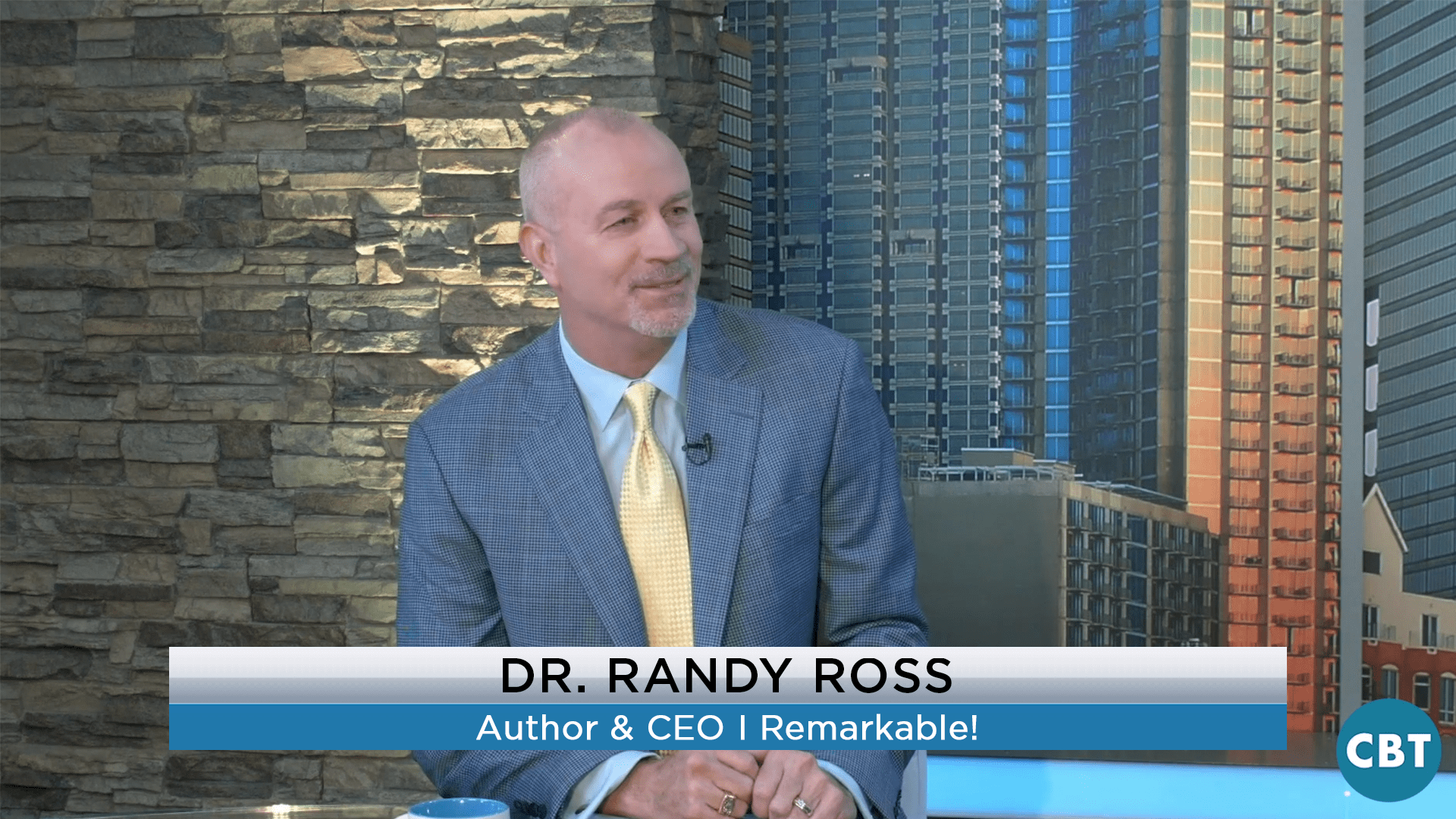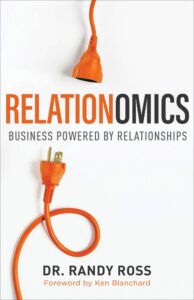Having a positive company culture is easy to talk about, but difficult to create and maintain. It’s easy to get caught up in the day-to-day grind and only focus on short-term productivity. In this segment, we discussed the importance of having a healthy work culture in the dealership with best-selling author, Dr. Randy Ross, founder and CEO of Remarkable!.
Jim Fitzpatrick: Dr. Randy Ross, welcome back to CBT News.
Dr. Randy Ross: Well, thank you, Jim. It’s good to be here.
Jim Fitzpatrick: Sure. It’s always great to have you in the studio. We get so many great comments and remarks from our dealers and our subscribers, so thanks for coming in today. Let’s kind of dive right in. You really work with companies, large and small, all over the globe, in helping them to build a better culture. Talk to us about how you define culture and the importance that it plays in a successful company.
Dr. Randy Ross: Well, culture is, in my opinion, the single most important differentiating factor that any organization possesses, and here’s why. I mean, we know that people and organizations, they thrive in relationally-rich environments. So the healthier the relationships, the healthier the business is going to be. You would think that’s common sense. But, unfortunately, it’s not-
Jim Fitzpatrick: It sounds easy enough, right?
Dr. Randy Ross: Exactly. But it’s not common practice. You’d be surprised, or maybe you wouldn’t, how many toxic environments that we go into, and we see how relationships have fallen apart. So asked to define culture. Culture is, from a technical definition, it’s the collective expression of the values, the beliefs, and the behaviors that people bring to any experience. So to make that simple, we like to say it’s how well we play together in the sandbox. That’s culture. It’s how we treat one another. Again, in an age of transparency, when it comes to pricing, in an age where there are multiple options, it’s the relational contacts, it’s the relational connectivity that’s going to make a difference.
Jim Fitzpatrick: Yes, for sure. There might be some people listening to us right now that say, “Oh, culture. It’s that touchy-feely stuff. We just got to get out there and sell some cars today. It’s all about making money and then the culture is kind of secondary.” What do you say to those company-owners or to those dealers out there that don’t put a big emphasis on building the right culture inside of a dealership?
Dr. Randy Ross: Well, the culture conversation can sometimes be a challenging one. But what I would say is, how important is the customer experience?
Jim Fitzpatrick: Right. No, it’s a good point.
Dr. Randy Ross: The customer experience is driven by how well the team plays together and how well they connect with one another, relationally. That’s what the culture is all about. That trickles down from leadership to the sales force to the front line to the customer experience. It’s all interconnected.
Jim Fitzpatrick: Right. And then it leads into employee retention, right?
Dr. Randy Ross: Absolutely.
Jim Fitzpatrick: Customer retention. Nobody wants to be in and around a toxic environment. All too often we will see that take place in the auto industry, especially with the high turnover-
Dr. Randy Ross: Absolutely.
Jim Fitzpatrick: … not just among salespeople, but also among managers. It’ll happen where a new manager takes over.
Dr. Randy Ross: That’s right.
Jim Fitzpatrick: He or she brings in their own team. Then if it ends up happening, they move on to another dealership, they take the team with them. So the dealership can never really get any traction in building a sound and healthy culture for the store.
Dr. Randy Ross: Well, that can be a devastating turn. Because when you have that, you have mediocre performance. You have low morale. There’s not a sense of loyalty. There’s really no team spirit. So essentially what you do is you create an environment where everybody looks out for their own best interest as opposed to building a team. A good culture is about we, what we can do together, as opposed to just me, self-protection, self-promotion to get what I want.
Jim Fitzpatrick: Yeah, that’s for sure. So talk to me about unhealthy dynamics that you see out there.
Dr. Randy Ross: Yeah. Well, I think that there are several culture killers. Let’s just talk about four. These are kind of interesting. The first one, I believe, is an unhealthy sense of competition. Now, in any sales environment, particularly automotive-
Jim Fitzpatrick: Automotive industry’s at the top of that list.
Dr. Randy Ross: It applies. We tend to leverage the human propensity toward competition. We all like to win. It feels good when we do. We want to be on the top of the heap. But, unfortunately, what happens is many sales organizations, they leverage that in an unhealthy way to drive higher performance, but to their own demise. Let me explain this.
You’ve seen this a thousand times over, where you have one or two top performers. They sit at the top of the nest. So the pecking order is established and they get preferential treatment. Accommodations are made. Even bad behavior is overlooked sometimes-
Jim Fitzpatrick: Oh, often.
Dr. Randy Ross: … in order to keep those top performers there. But it devastates the morale of everybody else. So here’s the question–
Jim Fitzpatrick: You nailed it on that one.
Dr. Randy Ross: Well, you can’t have unhealthy competition while at the same time trying to breed a spirit of collaboration. They’re mutually exclusive. So what happens is that if you … Let me just put it to you from a very frank bottom line standpoint. Would you rather have … If you had 20 salespeople, would you rather have 20 salespeople who all are selling 12 cars a month or would you rather have two selling 20 and the rest selling five to seven?
Jim Fitzpatrick: Right, exactly. I’d rather have the whole team selling 12 cars a month.
Dr. Randy Ross: Absolutely. So what we want to do is we want to create environments where best practices are shared rather than individuals constantly seeking to gain some sort of an advantage over everybody else. That’s easier said than done, but the point is is that unhealthy competition is anti-productive. What we want to do is create more collaborative environments.
Jim Fitzpatrick: Sure, sure, sure, sure. A company that does work on the relationship side and to build a better culture, one that’s transparent and everybody’s rowing in the same direction and you don’t have these isolated superstars, so to speak, to your point, out there, you have a tendency to see a greater sales process, a greater customer experience, as you were pointing out, and also much better customer retainment, right, at that dealership?
Dr. Randy Ross: Absolutely.
Jim Fitzpatrick: Because its always the case that if customers are not coming back to the dealership for their second, third, and fourth car or to have the work done on their vehicle at that selling dealership, it’s usually because there’s a problem in the dealership with it’s culture. Right?
Dr. Randy Ross: Well, think about it this way-
Jim Fitzpatrick: So it cures a number of ills.
Dr. Randy Ross: Well, it does. I think what we have to realize, in a dealership setting, is that oftentimes when customers come in the door they’re anticipating an antagonistic relationship.
Jim Fitzpatrick: There’s no question about it.
Dr. Randy Ross: I hate to say that-
Jim Fitzpatrick: They are.
Dr. Randy Ross: But it’s stereotypical of the industry.
Jim Fitzpatrick: It’s the fact of the matter. That’s right.
Dr. Randy Ross: They come in prepared. The barriers are up. They’re guarded.
Jim Fitzpatrick: That’s right. That’s right. They’re ready for a fight.
Dr. Randy Ross: From the very first encounter, there is this tension in that relationship.
Jim Fitzpatrick: Yeah, that’s right. It’s us against them.
Dr. Randy Ross: That’s right. So what happens is that translates throughout every experience. If we can’t capture that, turn that around, and build a deep relationship through a positive experience, then what happens is, as they go through that process in closing that deal, if anything goes wrong, let’s just say, we can’t quite pull it together, for some reason they’re not happy or satisfied with the experience, what you often see is managers then turn on the salesperson-
Jim Fitzpatrick: Happens all the time.
Dr. Randy Ross: … and take it out on the salesperson because what did you do wrong? When in reality, that’s the opportunity to coach up, for us to close the gap rather than widen the gap. Managers need to be taught how to do that in order to be able to bring out the very best in their teams. But it’s interesting you say that rowing together, because one of the chapters of our book is Row, Row, Row Your Boat. We say in that chapter that everybody has to have their oar in the water, which is just a real simple acronym, which means that everyone has to take ownership, there has to be a strong sense of accountability, and everybody has to assume responsibility for the results. But that won’t happen unless you have a relationally rich environment where feedback is a part of the ongoing process.
Dr. Randy Ross: Again, I think this is a limitation of many dealerships, is that we haven’t able to effectively establish open loops of continuous feedback through which that coaching can take place. That’s probably a conversation for another day. But I think we have to open up feedback loops. I’m not talking about just manager to salesperson. I’m talking the manager has to be open to feedback as well, which sometimes is a challenging thing to do in that type of a hierarchical environment. But we have to be able to coach down. We have to be able to coach up. We have to be able to coach laterally, in order to get the best performance from our people.
Jim Fitzpatrick: Right. That’s right. Before I let you get out of here, I know some of the dealers that are watching right now, the GMs and the sales managers will say, “Well, what do I do, Doctor, with the guy or girl that’s selling me 25 units a month, and yeah, they’re a maven and they’re a pain in the neck to work with, but, man, they get the job done, and I don’t want that person going to any other dealership? I want that productivity in my showroom. I certainly don’t want to be selling against it if they go to one of my competitors. I’ve just never really been able to win them over. Should I get rid of them? Do I keep them?” Because obviously, it’s going to cause a problem, and already has caused a problem in most cases, among the other employees or salespeople.
Dr. Randy Ross: Well, I can guarantee you that if that individual is demonstrating bad behavior, it’s already affecting the morale of the team.
Jim Fitzpatrick: Yeah, it is.
Dr. Randy Ross: But what I always encourage leadership to do is to offer the opportunity, cast the vision clearly, of what kind of an environment, what kind of a culture are we seeking to create here? The key is that everyone has to thrive in and contribute to the improvement of that culture.
Jim Fitzpatrick: Right. Even the star salesperson.
Dr. Randy Ross: Even the star salesperson. Now, oftentimes, what you can do is you can give them additional responsibility. If they can understand the concept of collaboration, they can impart knowledge to the rest of the team. You can incent them, not only on their high productivity, but on what value they bring to the rest of the team in terms of their knowledge, in terms of their skill, in terms of their experience and their background. Let them become a part of the coaching process. But you always extend the invitation. You have a clarion call to culture first. Then you have a culture alignment. You give them the opportunity to be a part of helping craft and shape that. But if their behavior continues to go against the core values that you founded your culture on, then there has to be either a coaching up or a coaching out experience.
Jim Fitzpatrick: Right. Right. Dr. Randy Ross, founder and CEO of Remarkable! and best-selling author, Relationomics. I love it, great name. For dealers that are watching right now, managers, middle managers, GMs and such, you got to get the book. It’s all in here. For those of you that want to learn more about Randy Ross, just go on and google Dr. Randy Ross. You’re going to see some really cool videos that you’ve done. Thank you for all your contribution here at CBT News. We appreciate it. But highly recommend the book. So thanks very much for joining us.
Dr. Randy Ross: Thanks, Jim.
Jim Fitzpatrick: Thank you.
CBT Automotive Network, the number one most watched network in retail automotive. This has been a JBF Business Media production.









